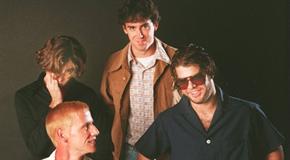Remembering For Squirrels 20 Years After Tragedy Struck Band
A young Gainesville band had the world by a string. Singer Jack Vigliatura IV, guitarist Travis Tooke, bassist Bill White and drummer Jack Griego had just inked a two-record deal with Epic Records and played a triumphant headlining gig at iconic New York club CBGB for the 1995 CMJ festival.

Their name was For Squirrels because, as they said, they were so committed to the band, they’d play for squirrels.
“It was like a Hollywood script, it happened so tragically,” recalls Gainesville music veteran Bill Bryson, who then owned the Covered Dish, which was For Squirrels’ favorite hometown venue. “Young guys come to college, form a band, they start getting serious, get a manager, go to CMJ, blow people out of the water, get signed to Epic, their album is named priority one behind Pearl Jam. Everything was lined up for tremendous success.”
Then, driving home from the CMJ festival, the tour van blew a tire, lost control and flipped several times, killing the 21-year-old Vigliatura, White, 23, and tour manager Tim Bender, also 23. Griego, who was 28 at the time, suffered a broken neck, and Tooke, then 23, sustained several injuries.
“They were good friends of mine,” Bryson says. “Most of them worked at the Dish. It was terrible. I got a call I think even before their parents did. A sheriff called me at the Dish, and I went down to my knees. I couldn’t believe it. There’s an alternate history of Gainesville that would have been written had those guys survived.”
Former manager Rich Ulloa recalls the devastation of Sept. 8, 1995.
“I was shaken to my core,” he says. “Stunned. Just beyond belief. There’s no road map when something like this happens.”
However, he also brims with passion for the memory of his friends and their music. He excitedly recalls the first time he saw For Squirrels perform – back then, he ran a record store and an independent record label in Miami, and one of his employees loved the band. Ulloa agreed to invite them to play in Miami as a favor. He missed much of their set but came in toward the end as Vigliatura was providing a vigorous demonstration on how to disco dance.
“I was blown away,” Ulloa recalls. “I thought, ‘What am I seeing?’ (Jack) had great moves and a sense of drama that no one I’ve seen before or after has had. When he walked on the stage, you’re not looking at anything else. That was the key to the band’s success.”
That night, the band closed with the Monkee’s “Stepping Stone,” and Ulloa says, “It was three o’clock in the morning, and I thought, ‘I have to work with this band. Have to.’“
Ulloa started booking the band in venues all over the city, and he says they grew at lightning speed.
“After three shows in Miami, they were a headline act on Saturday and they had never played the market before,” he says. “All of a sudden, they were the biggest buzz. By the summer of ‘94, we had done some big shows. We opened for Live and the Smithereens. I booked them a two-month tour.”
In 1994, the group self-released its first CD, Baypath Rd., and followed it later that year with the EP Plymouth, which was released on Ulloa’s Y&T label.
Vigliatura quit college just before his senior year to focus on the band, which took some convincing before his father agreed.
“We knew he was a talented kid, but we didn’t know he had that kind of talent,” Jack, Sr. says. “He enjoyed it immensely, and I think he saw it as a way to do other things he was passionate about – helping his family, helping other people in some way.”
When the accident happened, For Squirrels was on the brink of releasing a major-label debut, with the first single, a rock tune called “Mighty K.C.,” already picked out. The band’s sound blended elements of its heroes like REM and Nirvana – the “K.C.” in “Mighty K.C.” stands for Kurt Cobain, singer of Nirvana.
After the accident, the surviving members along with Epic Records decided to release the album, titled Example. According to Ulloa, it went on to sell roughly 150,000 copies.
Vigliatura, Sr. recalls the accident with understandable sadness.
“It’s the worst thing that could ever happen to a person,” Vigliatura, Sr. recalls. “You can’t explain to someone who doesn’t have kids what it’s like. Even though a parent could surmise what the pain would be like, they still wouldn’t come close.”
Vigliatura, Sr. says he takes solace in the people who approach him even today to tell him what his son’s music meant to them.
“People call us out of the blue, strangers, to tell us the music changed their life,” he says. “(Jack) had quite an impact on people.”
Though Vigliatura, Sr. attests to the fact that time heals – or at least lessens – all wounds, it’s still a hard pill to swallow after 20 years.
Bryson agrees. “I think about it every year,” he says. Then, finding a thread of hope in a tapestry of sadness, he adds, “They were doing what they loved. We might take some comfort in that.
“They were riding high when they went.”
 Daily Pulse
Subscribe
Daily Pulse
Subscribe

